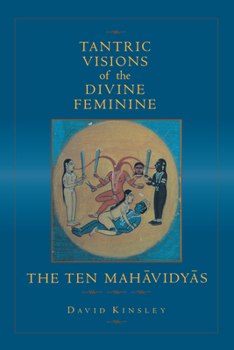Tantric Visions of the Divine Feminine: The Ten Mahavidyas
Select Format
Select Condition 
Book Overview
The Hindu pantheon is rich in images of the divine feminine--deities representing a wide range of symbolic, social, and meditative meanings. David Kinsley's new book documents a highly unusual group of ten Hindu tantric goddesses, the Mahavidyas, many of whom are strongly associated with sexuality and violence. What is one to make of a goddess who cuts her own head off, or one who prefers sex with a corpse? The Mahavidyas embody habits, attributes,...
Format:Paperback
Language:English
ISBN:0520204999
ISBN13:9780520204997
Release Date:August 1997
Publisher:University of California Press
Length:289 Pages
Weight:1.09 lbs.
Dimensions:0.9" x 6.0" x 9.0"
Customer Reviews
3 ratings
Engaging, Interesting, Easy to Get Into
Published by Thriftbooks.com User , 14 years ago
I loved this book. The subject matter is fascinating, and Mr. Kinsley's style is very engaging for an academic sort of subject. You will enjoy it!
A deep and comprehensive scholarly treatment of the Mahavidyas.
Published by Thriftbooks.com User , 16 years ago
This is probably the most comprehensive scholarly book on the Mahavidyas easily accessible within the English reading community. The Author explores one of the most fascinating themes in Hinduism, namely the Ten Goddesses supposed to grant supreme Knowledge, unveil the mystery of existence, drive humans towards liberation. Prof. Kinsley follows an approach which is predominantly scriptural, but also considering iconography, and anthropological aspects. He develops most of his arguments from Sanskrit sources, with extensive citations from the prominent Tantric and Puranic literature, but he also adds some information obtained on the field, through interview and direct experience. The result is an extremely pleasant read which may satisfy scholars of Hinduism and practitioners alike. I read this book seven years ago for the first time, and I keep finding new information in it. The books starts investigating the Mahavidyas as a collective entity, and five mythological and philosophical versions of the origin of this collective entity are presented. The idea that the Mahavidyas may be conceived as aspects of a Great Cosmic Goddess, MahaDevi, be She represented as Sati, Parvati, Kali, Durga or Satakshi, is introduced. Then chapters on the individual Mahavidyas provide a rich repository of primary sources, iconographical representations, and liturgical details. The concluding reflections explore the possible impact of this kind of worship from philosophical, psychological and sociological perspectives. The book, as good scholarly texts should be, is somewhat detached and dispassionate, presenting evidence in an un-opinionated and rational manner. However, the Author is able, through a careful choice of quotations from Tantras, to insert at least one very profound concept which may be useful also to practitioners. This is focused on what is perhaps one of Hinduism's crucial points, namely the relationship between the One and the Many. Strictly speaking, Hinduism has a very complex approach on the issue of One versus Many Gods. I am convinced that to characterize Hinduism as simply polytheistic or monotheistic is partial and superficial. Various Hindu traditions point at a substantial One-ness existing beyond Time and Space, but simultaneously portray a multiplicity of Spiritual Entities, layered through a stratified cosmos in which the Many dominate. The essence of Shaktism, (and of other Hindu traditions as well) is to realize the Oneness through Multiplicity. Unlike other Faiths which proclaim One Transcendent God, separated from, and not immerse and immanent in Nature, the Godhead of these Hindu traditions is -both- Transcendent and Immanent. It is Transcendent `before' Creation and `after' Dissolution, self-embraced in its timeless Unity. But it is immanent when conceived through the manifestation of Time and Space, Name and Form, and Multiplicity. The Ten Mahavidyas offer a wonderful symbolic depiction of this complex
thank you mr kinsley
Published by Thriftbooks.com User , 24 years ago
david kinsley is one of our heroes. he started to write very special and beautiful books about hinduism (especially about godesses/kali) in the late sixties - and continued his interesting and fruitful journey through the fields of barely known aspects of hinduism until today. his work on the ten mahavidyas is a crowning achievement. there are virtually no books about this theme field on the market - and there are no good books about the mahavidyas at all. kinsley fills the gap (once more)... and how! bravo!! kinsleys writing style is clear as a mountain spring, he really has a capacity for explaining complex hindu ideas with the utmost clarity. a must-read.






